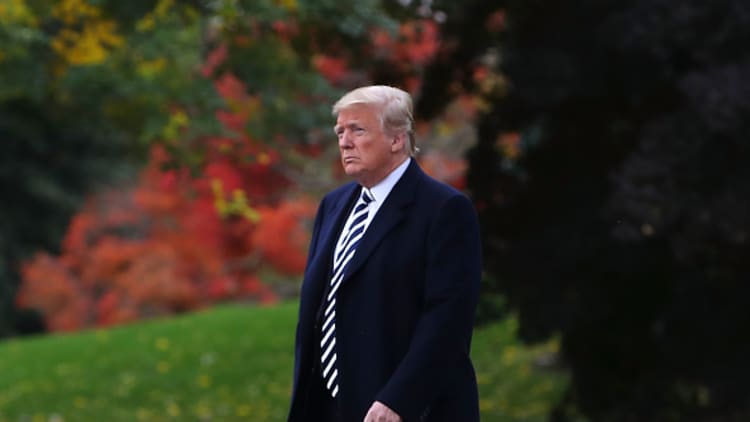President Donald Trump on Wednesday doubled down on his defense of Saudi Arabia, thanking the kingdom for helping to keep a lid on oil prices, amid bipartisan criticism for his statement on the brutal murder of journalist Jamal Khashoggi.
On Tuesday, Trump declared he would stand by Saudi Arabia, even though the CIA has reportedly concluded that Saudi Crown Prince Mohammed bin Salman ordered Khashoggi's killing. After releasing the statement, Trump repeatedly linked his position to his desire to boost arms sales to Saudi Arabia and the kingdom's role in preventing an oil price spike.
Early Wednesday morning, Trump took to Twitter to promote the recent sharp pullback in oil prices and to praise Saudi Arabia.
"Oil prices getting lower. Great! Like a big Tax Cut for America and the World. Enjoy! $54, was just $82. Thank you to Saudi Arabia, but let's go lower!," Trump tweeted, giving an inaccurate account of the drop in oil prices.
Trump's tweet underscored a message that is drawing fire from both Republicans and Democrats on Capitol Hill: The administration will overlook human rights abuses — even the murder of a U.S. resident like Khashoggi — if making a stand imperils the president's pursuit of economic growth.
On Tuesday, Sen. Bob Corker, the Republican chairman of the Senate Committee on Foreign Relations, said the White House is now moonlighting "as a public relations firm for the Crown Prince of Saudi Arabia."
Trump's statement prompted Corker, who is about to retire, and Democratic Sen. Bob Menendez to send a Global Magnitsky Act letter to the White House, requiring the president to determine whether Crown Prince Mohammed ordered Khashoggi's slaying.

A Saudi prosecutor determined last week that agents of the kingdom apprehended Khashoggi at the Saudi Consulate in Istanbul, gave him a lethal dose of tranquilizers and cut up his corpse to hide the evidence. The Saudis have changed their story several times since early October, initially saying Khashoggi, a prominent critic of Crown Prince Mohammed, left the consulate unharmed.
In his statement, Trump cast doubt on whether the crown prince ordered the killing, saying, "maybe he did and maybe he didn't!"
Trump's decision to restore sanctions on Iran, OPEC's third-biggest producer, put upward pressure on oil prices throughout much of the year. His administration has relied on Saudi Arabia to hike output — and convince other producers to pump more oil — to offset the inflationary impact of its hawkish Iran policy on oil prices.

Major crude oil benchmarks spiked to four-year highs one month before the sanctions went into force, but that rally has since unwound spectacularly. Oil prices have plunged 30 percent since early October, dragged lower by a broader market sell-off and growing consensus that supply will outstrip demand next year.
Trump also granted sanctions exemptions to Iran's biggest customers, alleviating concerns of supply shortages. Analysts say that blindsided the Saudis, who orchestrated a production hike among two dozen nations in June on the expectation that Iran's exports would plummet.
In his tweet, Trump appeared to confuse U.S. crude and Brent crude, the international benchmark for oil prices.
U.S. crude has indeed fallen to the low $50s, but it has not traded at $82 since late 2014. It hit a nearly four-year high at $76.90 on Oct. 3. Brent also touched a four-year high at $86.74 the same day.
The president's call for Saudi Arabia to push oil prices even lower, as well as his statement of support for the kingdom, come two weeks before OPEC meets with Russia and other producers in Vienna.
Following the oil market's plunge into a bear market, the alliance is expected to cut output to prevent a price-crushing crude glut from developing next year. The group has been coordinating oil production since last year to end a historic downturn in oil markets that began in 2014.
However, Trump's statements this week inject uncertainty into OPEC's decision-making process.
"You have the U.S. president strongly backing the Saudi crown prince, Mohammed bin Salman, and basically signaling that the price of that loyalty is that Saudi Arabia is going to continue to have to keep the taps open in terms of oil production," Helima Croft, global head of commodity strategy at RBC Capital Markets, told CNBC's "Squawk on the Street" on Wednesday.


